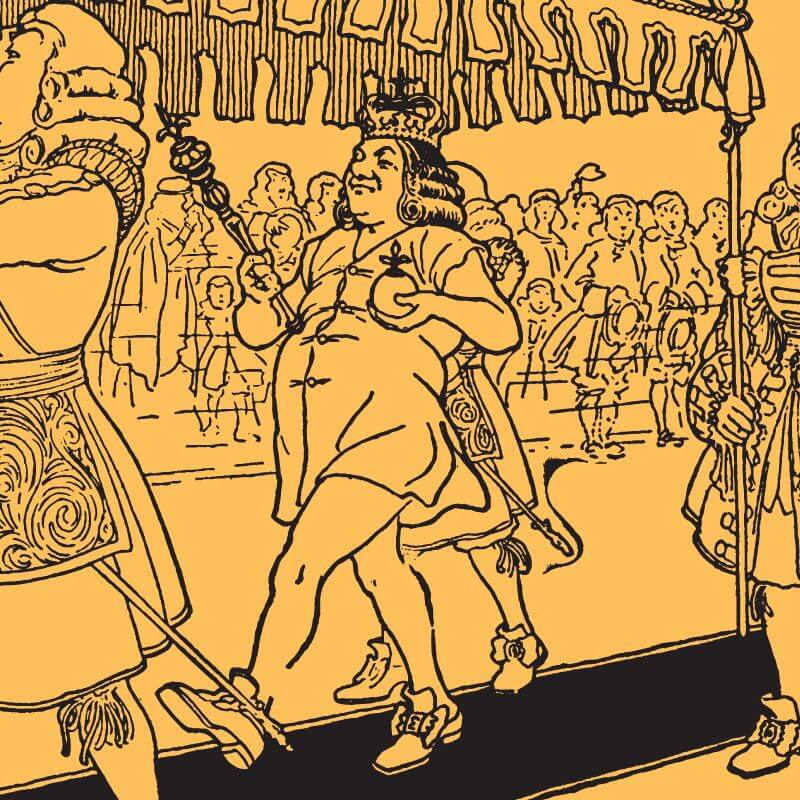CD, CD Çalar, DVD, DVD Çalar, SACD, LP, Plak Çeşitleri ve Fiyatları

Chick Gerrard explains why listening to your friend’s “beatsplaining” opinion is probably a waste of time.“
“The Emperor’s New Clothes” is a timeless fable by Hans Christian Andersen. The Danish author, also known for The Little Mermaid and The Ugly Duckling was a master storyteller with deep-rooted social themes interweaved.
You likely know the story, given the nonsense we’re all subjected to online these days, but allow me to remind you.
An emperor is obsessed with fashion. A duo of con artists disguised as master weavers promise the ruler garments of unparalleled grandeur, visible solely to the wise and capable.
The emperor loves the idea, falls for it head over heels, and they get to work. There are no garments, however, and they convince him to walk the streets naked, which he does.

[advert]
Everyone plays along, feigning admiration, fearing being scolded for not conforming, except for a child who shouts, “He’s nude.” The emperor is startled but continues walking naked anyway.
Lovely stuff, indeed. Fun for a children’s bedtime read, and thought-provoking for an adult. Everyone wins.
This tale serves as a satirical commentary on human behavior, revealing how people often conform to societal expectations, even if they know it to be false, out of fear or desire for approval.
It critiques the absurdity of pretentiousness and the power of peer pressure, and the tale is regarded as a commentary on the appraisal of art.
So what, if anything, has this got to do with music production? Fifteen years ago, I worked at a major tv network and the production team (of which I was one) was about forty-strong.
[advert]
At the time, I was an aspiring music producer, and everyone in the office knew so I’d play them my beats – ranging from techno to hip-hop.
And this is where an early form of ‘beatsplaining’ became apparent to me.
To clarify, no one in the office was a music producer. It was far harder back then, as AI didn’t exist. Some DJ’d, but most of the team were the creative media types. The ones to sell dreams to clueless clients for hundreds of thousands of dollars. Some wore bowties – they got the big bucks.
This was really the time of Mad Men. The only other alternative was Breaking Bad, but more people fancied making interstitials and dubbing ads than making crystal meth. Whatcha know?

Regardless of their TV-watching interests, they would all take an interest in my beats. Now I’m not the best, but I’m not the worst. I can tell you who that is later. But it doesn’t matter as the result was always the same.
[advert]
I’d load up a track as confidently and proudly as I could, I’d say: “This is my new beat”. I’d hand over the iPod. The corded earphones would go in and they would nod, look around, look concerned, look pensive, look lost, and almost every other human emotion you could squeeze into the one min or often less.
The response would always be, without fail every time, “The snare is too loud, ” “I’m not sure about that kick drum” or, the best of them all, “Is this mixed yet’?
I mean, come on! “Is this mixed yet”? Who the hell do you think you are, Jimmy Iovine, Dave Pensado, Yoda? What wise master do you think you are?
You must take it on the chin when people who don’t make music say something like that. That’s probably 90% of your target audience.
[advert]
However, like any good fable, there’s a twist. To entertain myself, remember this was a tedious station, so it wasn’t laugh-a-minute stuff; I’d play them one of my tracks but say Dr. Dre or Tiesto made it. It was as follows: “biggest artist of the time” and “type of track I’d made.”
And whatcha know – they loved it. Instant approval. Not one hint of ‘critical feedback’ or indeed anything at all – just ‘this bangs bro” or “that’s dope”.
They would, of course, have to take it further. “I love his stuff. Have you heard ‘insert mixtape no one has head of'”? In other words, they were not content with just liking something. The race was on to look knowledgeable once again.
In case it’s unclear, the lesson is in perception. Perhaps authors write under pseudonyms or music producers have mystical aliases to get around this. Audiences have a penned-up idea of what you are and who they are. Maybe that’s due to everyone being more visible on social media. Maybe it’s because people just have to have an opinion.
In the social media age it’s got worse. We live in a constant town square. Anxiety and mental health issues are increasing, and the wish for approval from peers and friends has become more exaggerated.
It’s almost guaranteed someone will say to this “Maybe your music was just shit”. That’s alright. If this lesson tells you anything: ignore them, be you, and be true to yourself.
You’ll find a way through if you keep making music for yourself.
[social-links heading=”Follow Attack Magazine” facebook=”https://www.facebook.com/attackmag” twitter=”https://twitter.com/attackmag1″ instagram=”https://www.instagram.com/attackmag/” youtube=”https://www.youtube.com/user/attackmag” soundcloud=”https://soundcloud.com/attackmag” tiktok=”https://www.tiktok.com/@attackmagazine”]
[product-collection]
attackmagazine

Chick Gerrard explains why listening to your friend’s “beatsplaining” opinion is probably a waste of time.“
“The Emperor’s New Clothes” is a timeless fable by Hans Christian Andersen. The Danish author, also known for The Little Mermaid and The Ugly Duckling was a master storyteller with deep-rooted social themes interweaved.
You likely know the story, given the nonsense we’re all subjected to online these days, but allow me to remind you.
An emperor is obsessed with fashion. A duo of con artists disguised as master weavers promise the ruler garments of unparalleled grandeur, visible solely to the wise and capable.
The emperor loves the idea, falls for it head over heels, and they get to work. There are no garments, however, and they convince him to walk the streets naked, which he does.

[advert]
Everyone plays along, feigning admiration, fearing being scolded for not conforming, except for a child who shouts, “He’s nude.” The emperor is startled but continues walking naked anyway.
Lovely stuff, indeed. Fun for a children’s bedtime read, and thought-provoking for an adult. Everyone wins.
This tale serves as a satirical commentary on human behavior, revealing how people often conform to societal expectations, even if they know it to be false, out of fear or desire for approval.
It critiques the absurdity of pretentiousness and the power of peer pressure, and the tale is regarded as a commentary on the appraisal of art.
So what, if anything, has this got to do with music production? Fifteen years ago, I worked at a major tv network and the production team (of which I was one) was about forty-strong.
[advert]
At the time, I was an aspiring music producer, and everyone in the office knew so I’d play them my beats – ranging from techno to hip-hop.
And this is where an early form of ‘beatsplaining’ became apparent to me.
To clarify, no one in the office was a music producer. It was far harder back then, as AI didn’t exist. Some DJ’d, but most of the team were the creative media types. The ones to sell dreams to clueless clients for hundreds of thousands of dollars. Some wore bowties – they got the big bucks.
This was really the time of Mad Men. The only other alternative was Breaking Bad, but more people fancied making interstitials and dubbing ads than making crystal meth. Whatcha know?

Regardless of their TV-watching interests, they would all take an interest in my beats. Now I’m not the best, but I’m not the worst. I can tell you who that is later. But it doesn’t matter as the result was always the same.
[advert]
I’d load up a track as confidently and proudly as I could, I’d say: “This is my new beat”. I’d hand over the iPod. The corded earphones would go in and they would nod, look around, look concerned, look pensive, look lost, and almost every other human emotion you could squeeze into the one min or often less.
The response would always be, without fail every time, “The snare is too loud, ” “I’m not sure about that kick drum” or, the best of them all, “Is this mixed yet’?
I mean, come on! “Is this mixed yet”? Who the hell do you think you are, Jimmy Iovine, Dave Pensado, Yoda? What wise master do you think you are?
You must take it on the chin when people who don’t make music say something like that. That’s probably 90% of your target audience.
[advert]
However, like any good fable, there’s a twist. To entertain myself, remember this was a tedious station, so it wasn’t laugh-a-minute stuff; I’d play them one of my tracks but say Dr. Dre or Tiesto made it. It was as follows: “biggest artist of the time” and “type of track I’d made.”
And whatcha know – they loved it. Instant approval. Not one hint of ‘critical feedback’ or indeed anything at all – just ‘this bangs bro” or “that’s dope”.
They would, of course, have to take it further. “I love his stuff. Have you heard ‘insert mixtape no one has head of'”? In other words, they were not content with just liking something. The race was on to look knowledgeable once again.
In case it’s unclear, the lesson is in perception. Perhaps authors write under pseudonyms or music producers have mystical aliases to get around this. Audiences have a penned-up idea of what you are and who they are. Maybe that’s due to everyone being more visible on social media. Maybe it’s because people just have to have an opinion.
In the social media age it’s got worse. We live in a constant town square. Anxiety and mental health issues are increasing, and the wish for approval from peers and friends has become more exaggerated.
It’s almost guaranteed someone will say to this “Maybe your music was just shit”. That’s alright. If this lesson tells you anything: ignore them, be you, and be true to yourself.
You’ll find a way through if you keep making music for yourself.
[social-links heading=”Follow Attack Magazine” facebook=”https://www.facebook.com/attackmag” twitter=”https://twitter.com/attackmag1″ instagram=”https://www.instagram.com/attackmag/” youtube=”https://www.youtube.com/user/attackmag” soundcloud=”https://soundcloud.com/attackmag” tiktok=”https://www.tiktok.com/@attackmagazine”]
[product-collection]